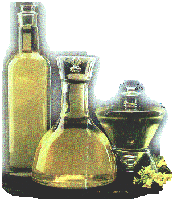

canola flower

safflower

olives
Oil Change
**********
Why is it so tough to cut fat out of our diets? That's easy:
It's because we love the taste, solidity, and rich fullness
that fat adds to food. As a result, some dishes don't seem
to taste as good without fat, making it hard to follow
nutrition experts' advice to avoid it.
Luckily, things aren't so absolute any more. Most of us do
need to cut back drastically on fat, particularly if we are
overweight or at risk of heart disease. But the latest news
from the nutrition community is that all fats are not created
equally evil. "There's a big shift going on right now toward
stating that all fats are not bad," says Frank M. Sacks, M.D.,
associate professor of nutrition at the Harvard School of
Public Health. This applies particularly to monounsaturated,
natural, liquid vegetable oils, such as olive and canola.
Adds Dr. Sacks, "Some liquid vegetable oils are actually
beneficial-primarily for lowering cholesterol levels. As
plant products, they contain substances that may help your
body ward off cancer."
The key here is "liquid." Hydrogenated fats, like shortening,
have been artificially hardened, which introduces another dietary
evil: trans-fatty acids. Do your health a favor by shunning the
primary villain, saturated fat (e.g., butter, coconut oil); by
avoiding hydrogenated fats (e.g., shortening, margarine); and
by substituting liquid monounsaturated vegetable oils
(e.g., olive, canola oil) whenever you crave that "fatty" taste.
These "good for you fats" have a slightly different flavor than
butter or margarine, but you'll quickly learn to love them.
-Rachel Eugster
* This article is from BCBSMA, "Living Healthy,"
Spring/Summer 1996, Volume III, Issue 2.
http://www.bcbsma.com/hresource/articles/viiii2eat1.html
CONFUSED ABOUT CHOLESTEROL? TAKE HEART
**************************************
Trying to keep up with the latest studies on fat cholesterol
could be a full-time job.
Take heart, says Jean Snook, nutritionist in the College of
Human Ecology at The Ohio State University. Snook says the
bulk of research points toward some relatively simple
guidelines to help control blood cholesterol.
The first thing to do is to ignore all those "no cholesterol"
labels splashed all over foods in the grocery store, Snook
says. Only foods derived from an animal source would have
cholesterol in them anyway. And even if a food is free of
cholesterol, it may still contain a high amount of fat.
"More research points toward saturated and hydrogenated fats
as the real culprits in raising blood cholesterol," Snook says.
A study Snook conducted with Gordon Wardlaw, associate professor
in the Division of Medical Dietetics at Ohio State, compared the
effects of several types of fats in men's diets. They found that
the men's blood cholesterol decreased when most of the fat in
their diets came from polyunsaturated or monounsaturated fats
rather than saturated fat.
"We found that some men may not even have to reduce their total
fat intake to lower blood cholesterol," Snook says. "They may
just have to switch a lot of the fat in their diet from saturated
to unsaturated sources--although there are other advantages
(like controlling weight) to lowering total fat intake."
How can you make the switch?
One way is to use liquid vegetable oil rather than solid
shortening as often as possible in cooking, baking and eating,
Snook says. Vegetable oils are more likely to contain unsaturated
fat.
Also, watch out for the words "hydrogenated" or "partially
hydrogenated" on food labels, Snook says. Those words indicate
that the vegetable oils used in the product have been converted
to fats that are solid or semi-solid at room temperature. That
process helps stabilize the oil, but also increases the level
of "trans fatty acids," which are also thought to affect
blood cholesterol.
**All educational programs conducted by Ohio State University
Extension are available to clientele on a nondiscriminatory basis
without regard to race, color, creed, religion, sexual orientation,
national origin, gender, age, disability or Vietnam-era veteran status.
Issued in furtherance of Cooperative Extension work, Acts of May 8
and June 30, 1914, in cooperation with the U.S. Department of
Agriculture, Keith L. Smith, Director, Ohio State University Extension.
http://www.ag.ohio-state.edu/~ohioline/lifetime/lt2-2j.html






 [margarine][sugar]
[refined]
[hydrogenated][veggies]
[margarine][sugar]
[refined]
[hydrogenated][veggies]
[HOME]
GEOCITIES ADVERTISING
This page hosted by  Get your own Free Home Page
Get your own Free Home Page








 Get your own Free Home Page
Get your own Free Home Page